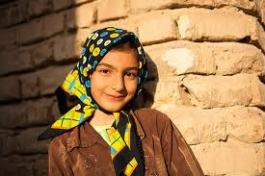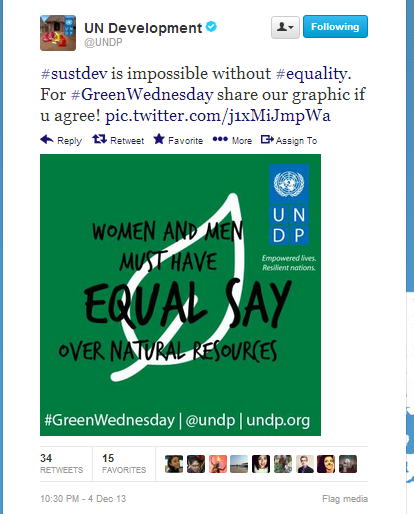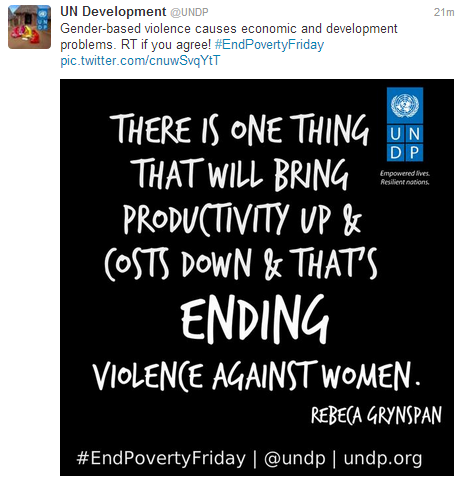
Monthly Archives: December 2013
Hijab: A woman’s rite of passage in Iran
At nine, Iranian schoolgirls are handed a chador and ushered into public life… and its paradoxes
The Islamic dress code – or hijab – is a game for 25-year-old Tahereh, who feels perfectly comfortable letting her headscarf fall off her shoulders as she covers the distance from her car to a friend’s apartment building on a residential street in central Tehran. The same cannot be said for the Basij militiamen who regularly cruise through this part of town on their motorcycles, stopping to reprimand pre-teen girls for stepping out of their home without a headscarf and a loose coat, or manteau. Typically, this is the minimum level of covering tolerated by an Islamic establishment whose official line is that “hijab is protection from sin.”
Despite the official hard line, the scale of covering up in Iran varies by region and neighbourhood, and many women agree that in terms of their rights, hijab is low on the list of their immediate worries. Nevertheless, it remains a universal topic of public discourse among the secularising middle class that helped elect the moderate President Hassan Rouhani into office this summer. Though the enforcement of public dress code has remained largely unchanged during his first three months in office, the government has indicated an imminent change in the current policy on “hijab and chastity.”
One recent signal is the announced plan to transfer the responsibility for hijab enforcement from the police force to the interior ministry, which would free the police to focus on more pertinent “security” issues. Another indication are the statements of Rouhani himself, which have been in line with his pre-election promises to lift the restrictions on personal freedoms young people experienced under the previous administration.
At a recent government meeting, the president advised the police force to approach the hijab issue “with respect for human dignity and refrain from excessive measures,” according to a 13 November front-page article in the reformist Shargh daily analysing the signs of a potential change in the official stance on hijab enforcement. At the same time, the newspaper highlighted Rouhani’s message to the public, in which he asked the people to treat “the topics of character, chastity and hijab” with sensitivity and to respect “societal norms.”
While many of his supporters view these overtures as a welcome reinstatement of personal rights, most find it difficult to discern their practical implications. The interpretation of proper hijab and its relation to chastity is not only different for each government office, but also for each family and social grouping. For members of the younger generation, who’ve spent their lifetimes under the rules of the Islamic republic, hijab is an everyday reality resulting from both official and social pressures. While many are opposed to the concept of mandatory dress code, the consensus is that much needs to change before hijab becomes a truly personal decision.
For Azadeh, 59, the imposition of hijab is more about social control than Islamic values. When it first became mandatory for office workers to cover their hair in 1981, two years after the Islamic revolution, she and her colleagues dug through their grandmothers’ wardrobes to find something suitable to wear. Over the next two years, the women were gradually directed to wear manteaus and slacks in one of three shades (black, grey or brown, all available at an official shop) and to exchange their headscarf for the maghnae, which envelopes the neck as well as the face.
“We were uncomfortable, but we also decided that the priority was to keep our jobs and remain active in society,” Azam says. “At the time, that was a very important issue” for women’s rights.
Gradually, the strict guidelines were imposed in public places as well. Azadeh recalls a particularly “bad time” in 1982, when revolutionary forces would round up women in Tehran’s Valiasr Square and shave off any hair peaking from under their headscarf with an electric razor. “It was never clear what the rules were -whether it was OK to show your fringe or not,” she says. “I still have dreams sometimes about finding myself in the middle of the street without my headscarf.”
Such nightmares are conspicuously absent for younger women like Leila, 28, who grew up learning about hijab from her female family members. “My mom is religious and always took good care of her hijab. I would always ask to borrow her headscarf to play dress-up,” she says. “My two older sisters were not like Mom, though. They would leave their hair out, and when I’d go out with them I understood that I shouldn’t act serious about my hijab around them the way I did with Mom. That’s when the paradox started.”
At school, nine-year-old girls are typically ushered into public life through a special ceremony called “Taklif” in which they are initiated into Islamic society. Mariam, 29, who grew up in a secular family, describes it this way: “They give you a chador, tell you what a big girl you are, teach you how to pray and what it means to be a Muslim. Then they say, ‘Dear girl, if you don’t pray or wear bad hijab, you will go to hell.”
Leila remembers the ceremony more fondly: “It was something really exciting, better than a birthday party. I remember that my mom sewed me a white chador. I can’t remember exactly what I thought, but I remember feeling very happy and grown-up.”
Despite their varying backgrounds, both Leila and Mariam experimented with wearing a chador – the traditional sheet-like garment Shia women wear to disguise their figures – in their teenage years. Both women say they were influenced by role models such as their sisters or TV show characters rather than religious factors, and both outgrew the practice by the time they reached adulthood.
“The older I got, the more I got out of the family mindset of asking what I can do to make Mom happy, thinking that it’s very good to read the Quran, behaving a certain way,” Leila says. “By the time I graduated high school, Mom’s explanations for doing these things became meaningless. Still, it was hard. What if bad hijab is a sin and I go to hell? I remember losing sleep over that.”
Today, both Leila and Mariam wear colourful headscarves and chic, tailored manteaus that at times draw unwanted attention from both the moral police and members of the public. Though both try to dress in a way that conforms to the status quo without compromising their personal tastes, they say the feeling of personal security is an important factor in their fashion choices.
“I’m a bit cowardly,” says Mariam. “When I’m returning home at night, I often wish I had a chador, I wish I wasn’t wearing makeup. There’s always the threat of getting sexually harassed in a taxi, or worse.”
Adds Leila: “Even if hijab becomes a free choice, I will go out covered up down to my ankles, because this society will not be ready day-to-day.”
Curiously, both the slightly younger Tahereh and pension-age Azadeh reject the issue of personal security as a reason to wear proper hijab. Asked how she would behave if hijab rules were lifted, Azadeh says she would “take her headscarf off immediately.”
“I’m not afraid of people,” she adds. “Maybe it would take them a week to adjust, but I don’t believe that someone would be so sexually affected by a woman’s lack of a headscarf. It’s just a rule imposed from above.”
On the issue of sexual harassment and groping taxi drivers, Tahereh, too, has a more assertive take. “If I’m in a situation when a man is making me feel uncomfortable because of the way I’m dressed, I’m not thinking ‘if only I had a chador,'” she says. “I’m thinking, ‘if only his eye sockets were empty.'”
Original article: http://www.theguardian.com/world/iran-blog/2013/dec/19/iran-hijab-islamic-veil
Filed under Uncategorized
Disappearance of Razan Zaitouneh Highlights Plight of Syrian Human Rights Community
(Published by Freedom House: December 13, 2013)
Freedom House condemns the December 9 abduction of prominent Syrian activist Razan Zaitouneh and calls for her immediate release. Zaitouneh’s disappearance serves as a chilling reminder of the dangers confronting human rights defenders in Syria.
Zaitouneh was reported missing December 10, after her neighbor, who had visited her the previous evening, found Zaitouneh’s apartment ransacked. Zaitouneh’s husband and two other activists who were with Zaitouneh the the night before were also missing. Laptops and files related to Zaitouneh’s work were taken, while money and other valuables were left untouched.
Radical Islamist groups, which threatened Zaitouneh on December 9, may be behind the abduction. A human rights lawyer, Zaitouneh is a co-founder of the opposition-affiliated Local Coordination Committees and leads the Violations Documentation Center, one of the most respected human rights organizations in Syria.
Abductions targeting peaceful activists in the rebel-held areas of northern Syria are part of the grim reality facing human rights defenders in the region. Having originally led the peaceful uprising against the government of Bashar al-Assad, Syria’s human rights community has been targeted by radical Islamist and al-Qaeda affiliated groups, such as Islamic State in Iraq and Syria and Al-Nusra Front.
Freedom House demands the immediate release of Zaitouneh and her colleagues.
Filed under Uncategorized
10 Human Rights Activists Who Made 2013 A Better Year For Humanity
Check out this list formed by the ONE Campaign on 10 human rights activists who are creating a better world and changing people’s lives! The list includes people from all over the world, including Africa, the US and the Middle East. In honor of Nelson Mandela’s death last week, we should all take a little time out of our day to honor those who make the world a better place and then carry their lessons out into the world ourselves.
“Never doubt that a small group of thoughtful, committed citizens can change the world; indeed, it’s the only thing that ever has.”
-Margaret Mead
http://www.buzzfeed.com/onecampaign/10-human-rights-activists-who-made-2013-a-better-y-fwk2
Filed under Uncategorized
This holiday season, think of those in need
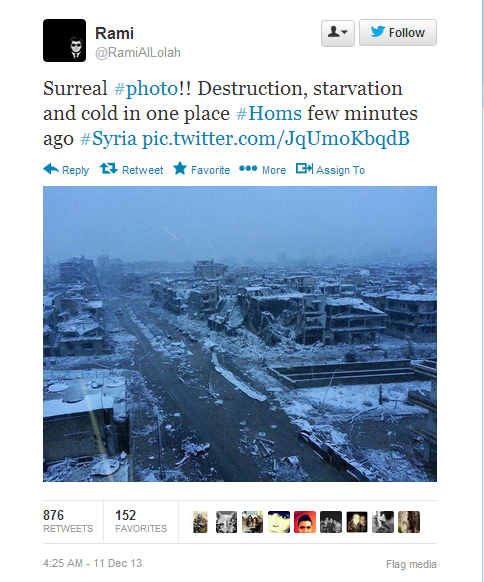
For example, this tragic picture of a snow storm that ravaged the city of Homs, Syria is reality for the millions of displaced Syrian citizens. Families, men, women and children alike are not only living through a brutal civil war, but the weather is currently adding to the destitution.
Fernanda Lima and the Dress that Shocked Iran
During the coverage of the drawing of World Cup placements, Iran filtered out all of the shots that included Fernanda Lima because her dress was “inappropriate”. Many Iranians were outraged over her outfit choice for being immodest, and insisted she should wear a “hijab” instead (cartoon on the left). However, many Iranians, as well as most of the rest of the world, were very supportive of her and defended her choice.
Article: http://www.bbc.co.uk/news/blogs-trending-25316942
Related articles
- Fernanda Lima, The Guiding Goddess World Cup (technologyka.wordpress.com)
- Iranians troll Lionel Messi, Brazilian model Fernanda Lima on Facebook (sports.ndtv.com)
- Iranians Troll Messi, Brazilian Model on Facebook (thejakartaglobe.com)
- A too Plunging Low Neckline in Iran (lunaticfrog.wordpress.com)
Filed under Uncategorized
Somali woman who reported rape sentenced
Click the title to see the full story.
This is a horrendous example of a rape victim being punished for something she did not deserve and did not bring upon herself. It is an egregious human rights abuse, and standards like this on rape victims needs to be changed NOW or else they will continue to occur where the perpetrator goes unpunished, while the victim has to live a life of shame afterwards. Also, cheers to these journalists who bravely broke the story and stood up for the woman. However, the Somalian government is punishing them for their “crime” which is another massive human rights violation to oppress free speech.
Even though media coverage has waned, the devastating Syrian crisis is continuing onward…
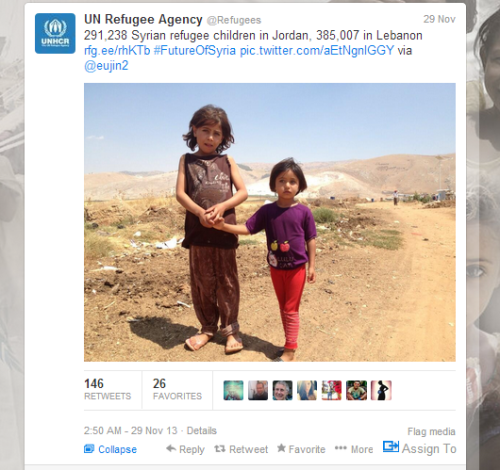
Check out this awesome and brave teenage girl who is standing up for human rights and gender equality, while also stealing the spotlight on stage!

